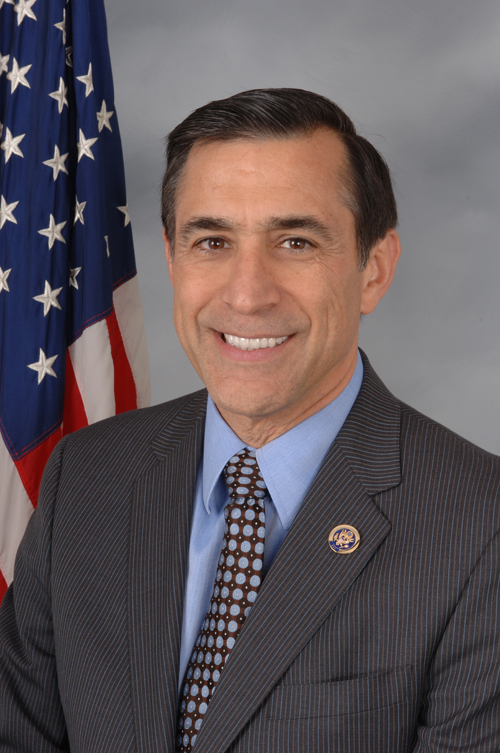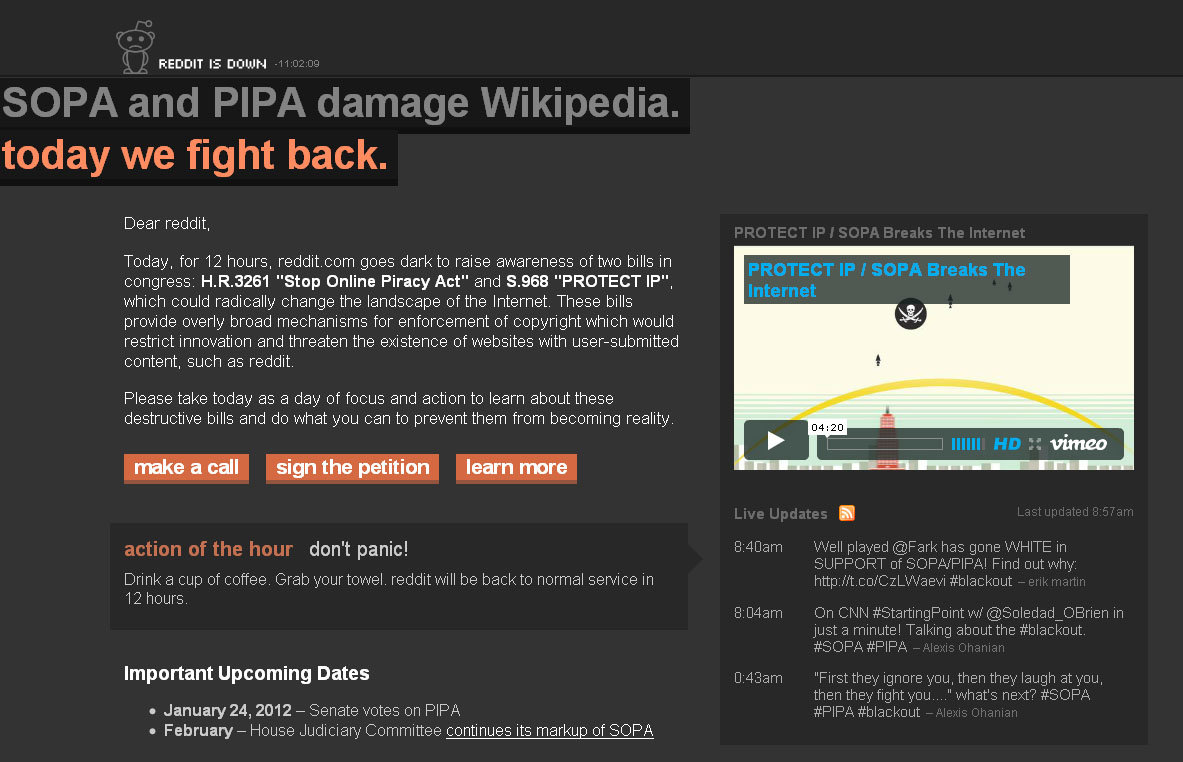
(MintPress)—On January 18th, several popular websites participated in a 24-hour Internet blackout, forcing Congress to rethink the Stop Online Privacy Act (SOPA) and the Preventing Real Online Threats to Economic Creativity and Theft of Intellectual Property Act of 2011 (PIPA). The OPEN Act, which was introduced by Representative Darrell Issa (R-CA) yesterday, is being proposed as a possible alternative.
A multitude of websites including Reddit, Wikipedia, WordPress, and Tumbler, blacked out their websites in an effort to raise awareness and encourage advocacy to end the two controversial Internet bills, which the sites believe would threaten the freedom of the Internet through censorship and regulations.
SOPA and PIPA were both introduced in mid 2011 to combat copyright infringement and online piracy. The bills target foreign sites that provide stolen or counterfeit goods by cutting off their ties to US based companies including credit card companies, search engines, and advertising networks. The legislation gives the Department of Justice the authority to seek court orders to shut down sites accused of facilitating copyright infringement activities.
Lamar Smith (R-TX), author of SOPA, says IP thefts cost the US economy some $100 billion annually, resulting in thousands of job losses. According to the Motion Picture Association of America, Inc. (MPAA), one of the main supporters of the bill, “[this legislation] feeds the revenues streams of American businesses and governments not organized criminals.”
Supporters of the bill include Pfizer, the Recording Industry Association of America, ABC, Walmart, the US Chamber of Commerce, and several other trade groups, associations and businesses.
Opponents believe SOPA and PIPA are censorship bills that threaten freedom of speech and privacy. In a letter to Congressional leaders, eight well-known Internet and technology companies stated, “the bills as drafted would expose law-abiding U.S. Internet and technology companies to new uncertain liabilities, private rights of action, and technology mandates that would require monitoring of web sites.”
Alexis Ohanian, co-founder of Reddit, has expressed concerns in an interview on TechCrunch, that small sites could not handle the high costs and time issues associated with censoring content in accordance with the vague legislation. Reddit, a user-generated content site, is considered to be a leading force behind the January 18th Internet blackout protests.
In a statement responding to the protests, former Connecticut Senator Chris Dodd, Chairman and CEO of the MPAA, said,
“It’s a dangerous and troubling development when the platforms that serve as gateways to information intentionally skew the facts to incite their users in order to further their corporate interests.”
Dodd believes that Internet sites like Wikipedia and Google are opposed to SOPA and PIPA because of self-interest rather than stopping illegal piracy activity.
Similarly, Wikipedia is concerned that media companies may take advantage of SOPA and PIPA for corporate reasons in a statement on their website during the blackout that said, “Big media companies may seek to cut off funding sources for their foreign competitors, even if copyright isn’t being infringed.”
While Congress rethinks the SOPA/PIPA debate after what is thought to be the largest Internet blackout protest in history, other members of Congress are developing an alternative. Representative Darrell Issa (R-CA) and Senator Ron Wyden (D-OR) have proposed the Online Protection and Enforcement of Digital Trade Act (OPEN) as a compromise to SOPA and PIPA. OPEN hopes to protect intellectual property rights using import trade laws.
According to a statement by Sen. Jerry Moran (R-KS),
“Unlike Protect IP and SOPA, the OPEN Act provides a clear and consistent system of due process and does not compromise the secure operation of the Internet through filtering.” The OPEN Act would make the International Trade Commission in charge of mandating violations of digital trade and not the Department of Justice.
Internet sites opposed to SOPA/PIPA have chosen to endorse the OPEN Act instead. In a letter of support, eight major Internet companies including Google, Facebook, and Twitter, wrote, “this approach targets foreign rogue sites without inflicting collateral damage on legitimate, law-abiding US Internet companies…”
Although the OPEN Act pleases many groups opposed to SOPA/PIPA, some copyright holders are more hesitant to offer their support. Michael O’Leary, Senior Executive Vice President for Global Policy and External Affairs for the MPAA said that “[the OPEN Act] fails to provide an effective way to target foreign rogue websites and goes easy on online piracy and counterfeiting.”
OPEN has its flaws just like SOPA and PIPA. Eric Goldman, Associate Professor of Law at Santa Clara University School of Law, expressed concerns about the International Trade Commission conducting investigations instead of the federal court and the possibility of websites shifting to foreign-based payment service providers and ad networks.
Despite its flaws, Goldman writes, “OPEN provides a useful starting point for a sensible conversation that could actually lead to acceptable compromises.” Issa has created a website for Americans to read and add suggestions to the draft bill in hopes of finding a collaborative solution that pleases both sides of the SOPA/PIPA debate.
Source: Mint Press


